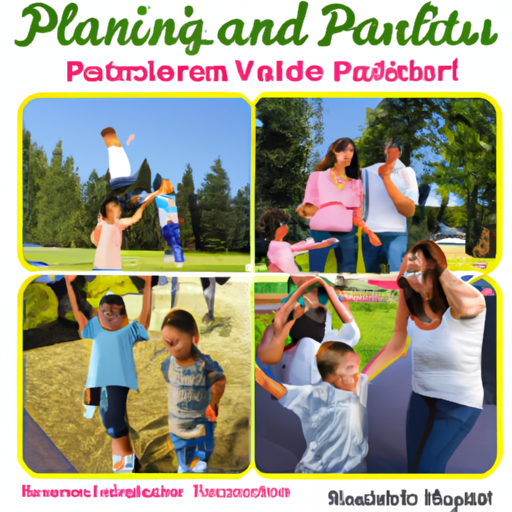
Being actively involved in our children’s lives is a vital aspect of parenthood, fostering a strong bond and facilitating their growth. But, how can we ensure that we are both actively involved and engaged? In this article, we will explore practical tips and strategies that will help you create meaningful connections, encourage open communication, and actively participate in your children’s lives, nurturing a loving and supportive environment for their development. Discover simple yet effective ways to cultivate a strong parent-child relationship and become an active participant in their lives.
Creating a Strong Foundation for Parental Involvement
As a parent, it is essential to create a strong foundation for your involvement in your child’s life. This means building a supportive and loving relationship, establishing open and effective communication, setting clear expectations and boundaries, and making time for quality family interactions.
Building a Supportive and Loving Relationship with Your Child
The first step in being involved in your child’s life is to build a supportive and loving relationship. This involves spending quality time together, showing affection, and being there for your child emotionally. By creating a safe and nurturing environment, you are laying the groundwork for a strong bond with your child.
Establishing Open and Effective Communication
Effective communication is key to understanding your child’s needs and concerns. Encourage open and honest communication by actively listening to your child, asking open-ended questions, and validating their feelings. By keeping the lines of communication open, you will be better equipped to address any issues that arise and to stay involved in their lives.
Setting Clear Expectations and Boundaries
Setting clear expectations and boundaries is vital in establishing a healthy parent-child relationship. Clearly communicate your expectations regarding behavior, responsibilities, and academic performance. By setting these boundaries and consistently enforcing them, you are teaching your child important values and providing them with a sense of structure and security.
Making Time for Quality Family Interactions
In our busy lives, it is crucial to prioritize quality family time. By setting aside dedicated time for activities and conversations, you are showing your child that they are important to you and that you value spending time together. Whether it’s a weekly game night, family meals, or going for walks together, these interactions play a crucial role in building a strong parent-child relationship.
Being Present and Engaged in Your Child’s Daily Life
Being present and engaged in your child’s daily life involves actively participating in their education, extracurricular activities, homework, and everyday conversations and activities.
Attending School Events and Parent-Teacher Conferences
Attending school events and parent-teacher conferences is an essential way to stay involved in your child’s education. By attending these events, you are showing your child that their education matters and that you are invested in their academic success. It also provides an opportunity for you to communicate with your child’s teachers and gain insights into their progress and areas of improvement.
Participating in Extracurricular Activities
Encouraging your child to participate in extracurricular activities and actively engaging in them alongside your child is a great way to support their interests and passions. By attending their games, performances, or competitions, you are demonstrating your support and interest in their personal development. It also allows for shared experiences and creates memories that will last a lifetime.
Helping with Homework and School Projects
Taking an active role in your child’s academic life by assisting with homework and school projects helps them develop good study habits and reinforces the value of education. Show interest in their assignments, offer guidance when needed, and praise their efforts. By being available to help, you are showing your child that their education is a priority.
Engaging in Everyday Conversations and Activities
Engaging in everyday conversations and activities is an effective way to strengthen your relationship with your child and stay involved in their daily life. Take the time to listen to their stories, ask about their day, and engage in activities that they enjoy. These seemingly small moments contribute to a deeper connection and allow you to be a part of their growth and development.

Encouraging Independence and Responsibility
To ensure that you are actively involved in your child’s life, it is essential to encourage their independence and responsibility.
Assigning Age-Appropriate Chores and Praise Efforts
Assigning age-appropriate chores not only helps lighten your load but also teaches your child the value of responsibility. By involving them in household tasks and praising their efforts, you are nurturing their sense of independence and self-confidence. Recognize their contributions and let them take pride in their accomplishments.
Encouraging Decision-Making and Critical Thinking
Encouraging your child to make decisions and think critically allows them to develop valuable life skills. Provide opportunities for them to make choices and problem-solve, guiding them along the way. By supporting their decision-making process, you are instilling a sense of autonomy and preparing them for future challenges.
Supporting Personal Goals and Interests
As a parent, it is important to support your child’s personal goals and interests. Encourage them to explore their passions and hobbies, and help them set achievable goals. By showing genuine interest, providing resources, and cheering them along the way, you are fostering their growth and development in areas that bring them joy.
Teaching Life Skills and Problem-Solving Strategies
Teaching your child essential life skills and problem-solving strategies is crucial in preparing them for independence. Teach them practical skills such as cooking, budgeting, and time management. Additionally, guide them in developing problem-solving strategies by encouraging them to brainstorm solutions and evaluate the potential outcomes. These skills will serve them well throughout their lives.
Being a Positive Role Model
As a parent, your actions and behaviors are closely observed by your child. Being a positive role model is vital in teaching them good values, morals, and life skills.
Demonstrating Good Values and Morals
It is important to demonstrate good values and morals in your everyday life. Show kindness, honesty, and empathy towards others. By modeling positive behavior, you are teaching your child how to navigate social situations, make ethical decisions, and contribute positively to society.
Practicing Self-Care and Managing Stress
Taking care of yourself and managing stress is not only essential for your well-being but also sets a positive example for your child. Show them the importance of self-care by prioritizing your own physical and mental health. Teach them healthy ways to cope with stress, such as exercise, mindfulness, or engaging in hobbies.
Showing Respect and Empathy for Others
Emphasize the importance of respect and empathy towards others in your interactions with your child and those around you. Teach them to value diversity, treat others with kindness, and to be inclusive. By demonstrating respect and empathy, you are instilling important values in your child and helping them develop strong interpersonal skills.
Handling Conflicts and Mistakes in a Healthy Manner
Conflict and mistakes are inevitable in life, and it is important to teach your child how to handle them in a healthy manner. Model effective conflict resolution skills by approaching disagreements calmly, actively listening, and finding mutually agreeable solutions. Show your child that mistakes are opportunities for learning and growth, and encourage them to take responsibility for their actions.

Promoting Educational and Intellectual Development
Promoting educational and intellectual development is a crucial aspect of being involved in your child’s life.
Reading and Learning Together
Read with your child regularly and engage in discussions about the books or topics you explore. This not only strengthens their reading skills but also encourages critical thinking and expands their knowledge. Make learning a fun and interactive experience for both of you.
Providing Resources and Encouragement for Learning
Provide your child with the resources they need to thrive academically. This may include access to books, educational apps, or online resources. Cultivate a positive learning environment by celebrating their achievements, encouraging curiosity, and being actively involved in their educational journey.
Engaging in Educational Trips and Outings
Take advantage of opportunities for educational trips and outings. Visit museums, science centers, historical sites, or nature reserves. These experiences offer valuable learning opportunities and create lasting memories. Encourage your child to ask questions and engage with the exhibits to enhance their understanding.
Supporting Hobbies and Curiosity
Your child’s hobbies and curiosity play a crucial role in their intellectual development. Support their interests by providing them with the necessary tools, resources, or lessons. Encourage their curiosity by answering their questions or guiding them to find answers through research or exploration. By nurturing their passions, you are fostering a lifelong love for learning.
Fostering Emotional Well-being and Mental Health
Ensuring your child’s emotional well-being and mental health is essential for their overall development and happiness.
Creating a Safe and Nurturing Environment
Create a safe and nurturing environment where your child feels secure and loved. Establish routines, provide consistent support, and encourage open communication. By fostering a sense of safety and acceptance, you create a foundation for positive emotional well-being.
Encouraging Expression of Emotions
Allow your child to express their emotions freely and without judgment. Provide them with a safe space to share their thoughts, fears, or concerns. Teach them healthy ways to express their emotions, such as through art, journaling, or talking with a trusted adult. By validating their feelings, you help them develop emotional intelligence and resilience.
Promoting Healthy Coping Mechanisms
Teach your child healthy coping mechanisms to deal with stress and difficult emotions. Encourage physical activities, mindfulness exercises, deep breathing techniques, or engaging in hobbies. By providing them with a toolbox of coping strategies, you empower them to navigate challenges and build resilience.
Seeking Professional Help when Necessary
It is essential to recognize when professional help may be needed for your child’s emotional well-being or mental health. If you notice persistent concerns or significant changes in behavior, seek guidance from a qualified mental health professional. Early intervention can make a significant difference in your child’s overall well-being.
Nurturing Healthy Social Relationships
Nurturing healthy social relationships is crucial for your child’s emotional and social development.
Encouraging Friendships and Social Interactions
Encourage your child to develop and maintain healthy friendships. Provide opportunities for social interactions such as playdates, group activities, or community events. Teach them important social skills, such as active listening, sharing, and resolving conflicts peacefully.
Teaching Conflict Resolution and Empathy
Teach your child how to navigate conflicts and disagreements in a healthy manner. Encourage them to see things from others’ perspectives and empathize with their feelings. By promoting empathy and conflict resolution skills, you are nurturing their ability to build and maintain positive relationships.
Supporting Inclusivity and Diversity
Emphasize the importance of inclusivity and diversity in your child’s social interactions. Teach them to appreciate and respect differences in others, including cultural, racial, and socioeconomic diversity. Encourage them to be inclusive and to stand up against discrimination or bullying.
Addressing Bullying and Peer Pressure
Being involved in your child’s social life means addressing bullying and peer pressure. Teach your child how to recognize bullying, encourage them to speak up if they witness bullying, and provide them with strategies to handle and report incidents. Additionally, educate them about peer pressure and empower them to make their own choices based on their values.
Balancing Work and Family Life
Finding a balance between work and family life is crucial to being actively involved in your child’s life.
Establishing Priorities and Time Management
To effectively balance work and family life, establish priorities and practice effective time management. Identify the most important activities or events in your child’s life, and make them non-negotiable. Create a schedule that allows for dedicated family time, and communicate your availability to your employer, if possible.
Creating Flexible Work Schedules when Possible
Explore the possibility of creating a flexible work schedule that allows you to be more present in your child’s life. If your job permits, discuss alternative work arrangements, such as flextime or telecommuting. By finding ways to be more available to your child, you are actively involved in their daily life.
Finding Quality Childcare and Support Systems
If you require childcare, prioritize finding a quality provider or system that aligns with your values and needs. Research reputable centers or caregivers and ask for recommendations. Establish open lines of communication and build a relationship with your chosen childcare provider to ensure your child’s well-being and to stay involved in their development.
Making the Most of Parental Leave and Vacation Time
When parental leave or vacation time is available, make the most of it by dedicating quality time to your child. Plan activities, outings, or even stay-at-home days to create lasting memories and strengthen your bond. By maximizing these periods of uninterrupted time, you are actively participating in your child’s life.
Collaborating with Your Co-Parent or Support Network
Collaborating with your co-parent or support network is crucial in ensuring your involvement in your child’s life.
Maintaining Consistent Parenting Strategies
Maintaining consistency in parenting strategies is vital for your child’s well-being and development. Communicate with your co-parent about rules, expectations, and disciplinary approaches to provide a stable and cohesive environment for your child.
Communicating and Cooperating Effectively
Open and effective communication with your co-parent or support network is key to ensuring your involvement in your child’s life. Keep each other informed about important events, discuss concerns, and work together to solve problems. By maintaining a united front, you demonstrate to your child that their well-being is a priority.
Sharing Responsibilities and Decision-Making
Share responsibilities and decision-making with your co-parent or support network. Collaborate on important decisions regarding your child’s education, health, and extracurricular activities. By involving others in your child’s life, you expand their support system and ensure a well-rounded approach to their development.
Seeking Help and Guidance when Needed
Recognize that asking for help and guidance is a strength rather than a weakness. If you are struggling with parenting challenges, seek advice from trusted sources such as parenting coaches, support groups, or family counselors. By reaching out for support, you are demonstrating your commitment to being actively involved in your child’s life.
Adapting to the Changing Needs of Your Child
As your child grows and develops, it is important to adapt your parenting style and approach to meet their changing needs.
Being Attentive to Developmental Milestones
Pay attention to your child’s developmental milestones and adjust your expectations and parenting strategies accordingly. Recognize that each child develops at their own pace and celebrate their progress. Stay informed about typical developmental stages to better understand and support your child.
Adjusting Parenting Style and Approach
As your child grows older, adjust your parenting style and approach to empower them to become independent and responsible individuals. Gradually give them more autonomy while still providing guidance and support. By adapting your parenting style, you foster their growth and allow them to thrive.
Addressing Challenges with Flexibility and Patience
Challenges are a part of parenting, and it is important to approach them with flexibility and patience. Give yourself and your child room to make mistakes and learn from them. Adjust your approach as needed, and remember that growth and progress take time.
Encouraging Self-Reflection and Growth
Encourage your child to engage in self-reflection and personal growth. Help them develop a growth mindset, where they understand that effort and perseverance lead to improvement. Teach them the value of learning from their experiences and adapting their behaviors and strategies accordingly.
By following these guidelines, you can ensure that you are actively involved and present in your child’s life. Remember, being a loving and supportive parent and actively participating in your child’s daily activities and development is a continuous effort that will have a lasting positive impact on their well-being and future success.






